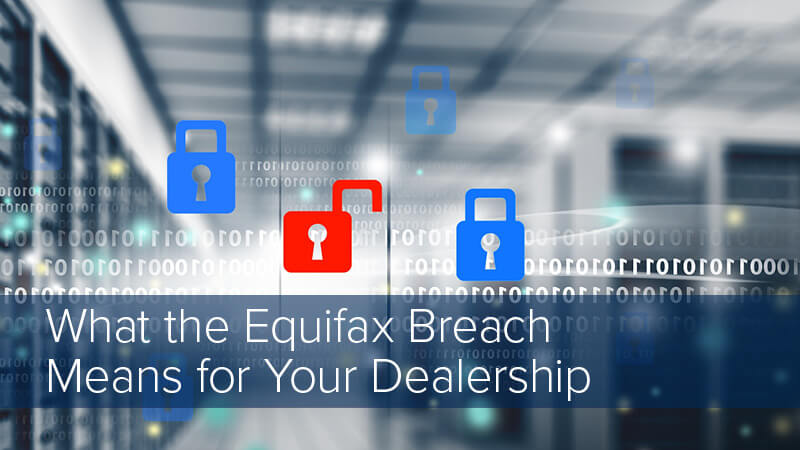Your customers may be impacted by the latest big data breach affecting Equifax, one of the three nationwide credit-reporting agencies, which compromised private credit and financial information for 143 million Americans.
The breach can raise issues for dealers that offer financing and need to check customer credit. Customers may have questions, or worse, have “credit freezes” or alerts on their credit reports.
A recent article in the NADA newsletter entitled “The Equifax Data Breach: What Dealers Should Know” provided some good information on how dealers may be affected by the breach.
To help your finance team navigate these unique challenges and help consumers at risk, we’ve compiled some additional links that may help answer some of your questions:
What should my dealership do if we see a fraud alert or get a “frozen credit” report?
Fraud alerts and frozen credit function differently and need to be addressed in different ways. In both cases, the customer places these alerts on their account to prevent fraudulent activity.
What is a fraud alert and how do I deal with it?
Fraud alerts are warnings a consumer places on their credit file to notify you that there may be a potential case of identity theft or fraud. These alerts typically last 90 days and are free for the consumer to place. You may still run the customer’s credit as normal, but before creating a new line of credit for this consumer, your dealership should take extra steps to confirm the customer’s identity.
What is a credit freeze and how do I deal with it?
In a credit freeze, no one can access the customer’s credit, including the customer, until the freeze is removed. Customers must contact a major credit agency to create a PIN and place these freezes, as well as contact them again using the special PIN to remove the freeze. In some cases, there are fees for the customer to freeze/unfreeze their credit. In this case, the customer must take action before you may review their credit.
To learn more about fraud alerts and credit freezes, view the FTC’s Frequently Asked Questions.
Where can my customer find out if they’re affected or get information about the breach?
Customers can find out if they are affected at this link. It is recommended that they only use this site on a trusted and secured connection.
How can my customer protect themselves?
Whether or not their information was exposed, consumers can get a free year of credit monitoring through Equifax after checking if they are affected. Consumers should closely monitor existing credit cards and bank accounts for unfamiliar activity. Consumers may also get a free credit report from annualcreditreport.com to check for new accounts or inquiries they may not have authorized.
Customers can visit identitytheft.gov/databreach for more tips to deal with identity theft or the threat of identity theft as a result of the breach.

